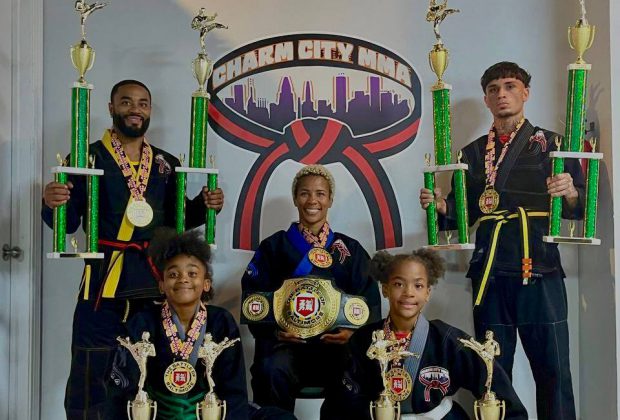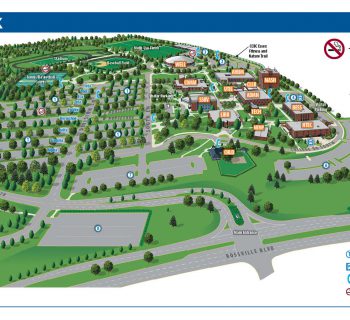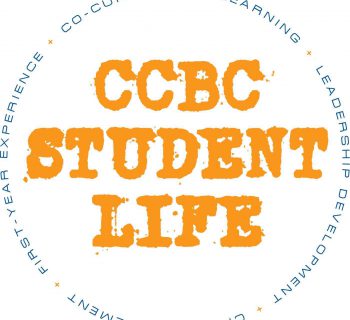The writer of this article was part of a summer honors experience: Voices From Our Backyard: Local News Narratives during which students created and wrote stories to be published in community news outlets.
By Asher Naval
The silence in the studio was deafening.
“And the winner of the performance competition is – The Rex Team!”
With that announcement, a group of young combat athletes ages 6 to 17, jumped for joy and hugged their teammates; others were stone-faced, quietly realizing their team had just come in second.
Such was the scene at Charm City Mixed Martial Arts & Life Enrichment (CCMMA)’s summer camp performance competition in July. The summer program is one of the many programs that the Charm City gym offers as an activity after school.
Charm City MMA 2024 Summer Camp is a three-month competition among the members of the gym that challenges students in areas from their academic prowess to their physical capabilities and discipline.
At the competition, Joseph Rollins, Rex Team mentor, calmed down his elated team. “Good job, guys! Enjoy the moment but let’s not forget the other event on Thursday,” he said.
Meanwhile, Nyjah Rollins, the mentor of the second place Falco Team, told its members to use this moment as motivation to improve their routine and come back stronger for the next event.
The Rollinses, who are married to each other, founded CCMMA in Highlandtown, one year ago. They have a combined experience of more than two decades as educators in this form of training and have earned multiple belts, trophies, and medals in different tournaments of various disciplines of martial arts.
Nyjah Rollins is one of the first American women to win Worlds, Pan, and European BJJ Championships while Joseph Rollins has been an MMA instructor since 2017, spanning from D.C. to Baltimore. They are also currently school teachers in City Springs and involved in the Baltimore Curriculum Project, where they teach MMA as an in-school program to elementary and middle school students.
CCMMA is one of several after-school programs aimed at improving the success of young students. As of 2023, the Maryland After-school Alliance‘s fact sheet shows that pre-K to high school students who are involved in these types of programs accelerate not only in their academic life, but also in their holistic health.
Joseph said he sees first-hand the improvements that their students make in their academics, claiming that some students achieved attendance awards and high honors from their schools only after becoming involved in the Rollins’ program.
“Kids are so looking forward to us picking them up, that they also don’t want to miss school, because they want to be here at the martial arts academy,” Nyjah added.
Nyjah said that one of the struggles that parents had was children not finishing school assignments. She said that by being in the program, “they’re completing their homework...They’re also getting better rest which means they perform better at school.”
Nyjah said her main concern with the students is their struggle with independent work. “One of the things that we’ve really done a fantastic job within our program is allowing kids to have productive struggle,” adding that CCMMA’s program encourages students to be, “okay with struggling and working to solve problems without feeling like I’m gonna give you the answer.”
She emphasized that the kids need to build up the stamina to do hard things.
“We’re going to see whatever skill they don’t actually have and focus on that skill,” Joseph said. “If we give you grade level work and we realize that there’s a skill you’re missing, we would then go back and just focus on the skill.”
CCMMA’s after-school program not only helps the students with their academic progress, but also with their behavior.
The latest bullying report from the website of Maryland State Department of Education states that 19.2% of students get bullied, and 41.3% of them think that they would get bullied again.
In addition, only 44.2% of the cases were notified to an adult, resulting in many negative effects to their schoolwork, relationships with family and friends, feelings about self, and their physical health.
Joseph and Nyjah were clear that this is an issue that needs to be addressed. Promoting de-escalation might look counterintuitive for a mixed martial arts academy, but Joseph said that it matters where the children learn, as some parents might think that learning self-defense sports will make their children more violent towards others.
“It matters where you put your child. If they’re teaching them the wrong thing, then you would have to be concerned because then they could go apply it in the wrong way,” Joseph said. “But if you know where you’re putting your children at, when it’s okay to defend themselves, and what does that look like, or how to deescalate a situation before it ever has to get to you physically needing to use your body to stop someone, that’s the push that we make.”
Joseph said that martial arts participation actually helps children deal with aggressive tendencies. “At least with martial arts, you teach them how to control that in a way that is considered acceptable and safe.”
Amaury Weiss, an upcoming 7th grader, who participates in Charm City MMA's various activities, said that the bullying prevention tactics from the program make him feel safe.
Charm City MMA also offers volunteer roles for teenagers, to comply with their community service hours.
“Kids learn better from people who they identify as ‘cool.’ They naturally would look up to or mimic the behaviors that they would see from middle school and high school students,” Nyjah said. “If we put positive examples and leaders in front of them, they're more likely to mimic those behaviors, but then we also teach our teenagers that you are a leader within everything you do.”
Cinkia Farmer, a 17-year-old MMA instructor, was exposed to mixed martial arts during the in-school program at KIPP DC Northeast Academy. Ever since, she’s been dedicated to Charm City MMA and working with the kids.
“We have kids actually looking up to us. So, we have to do our best to show them how to be in this world because here, we show to respect people or how to talk to people,” Cinkia said. “But out in the real world, it’s like it’s different because not everyone was taught the same.”
According to the Baltimore City State’s Attorney’s Office data there was a 208 percent increase in overall juvenile crime in Baltimore City over the last three years.
Austin Piper, one of the volunteers who had experience with gangs said that’s why after-school and in-school programs like CCMMA are important. “Some kids in here really look forward to that path, like trying to be in gangs and stuff like that. That’s when I talk to them and tell them ‘Hey, that’s not right. I’ve already been through there and it’s nothing good,’” he said. “They’re good kids when they’re by themselves, but when it’s like people, that acts out of pocket, they’re trying to act different.”
It’s a partnership with the parents to make their children the best versions of themselves, both Joseph and Nyjah agree. It’s also about the communication between the parents, the school, and the after-school program that resolves whatever the children struggle with.
Sara Weiss, Amaury’s parent, also agrees. “I really wanted him to have a place where he felt safe, and also increase his confidence and just feel better about who he is. We’re very isolated here, and the gym is like the biggest support that I have,” she added. “I don’t know if I could do really much of anything without the support that this gym offers, so I definitely see them trying to be a community.”














